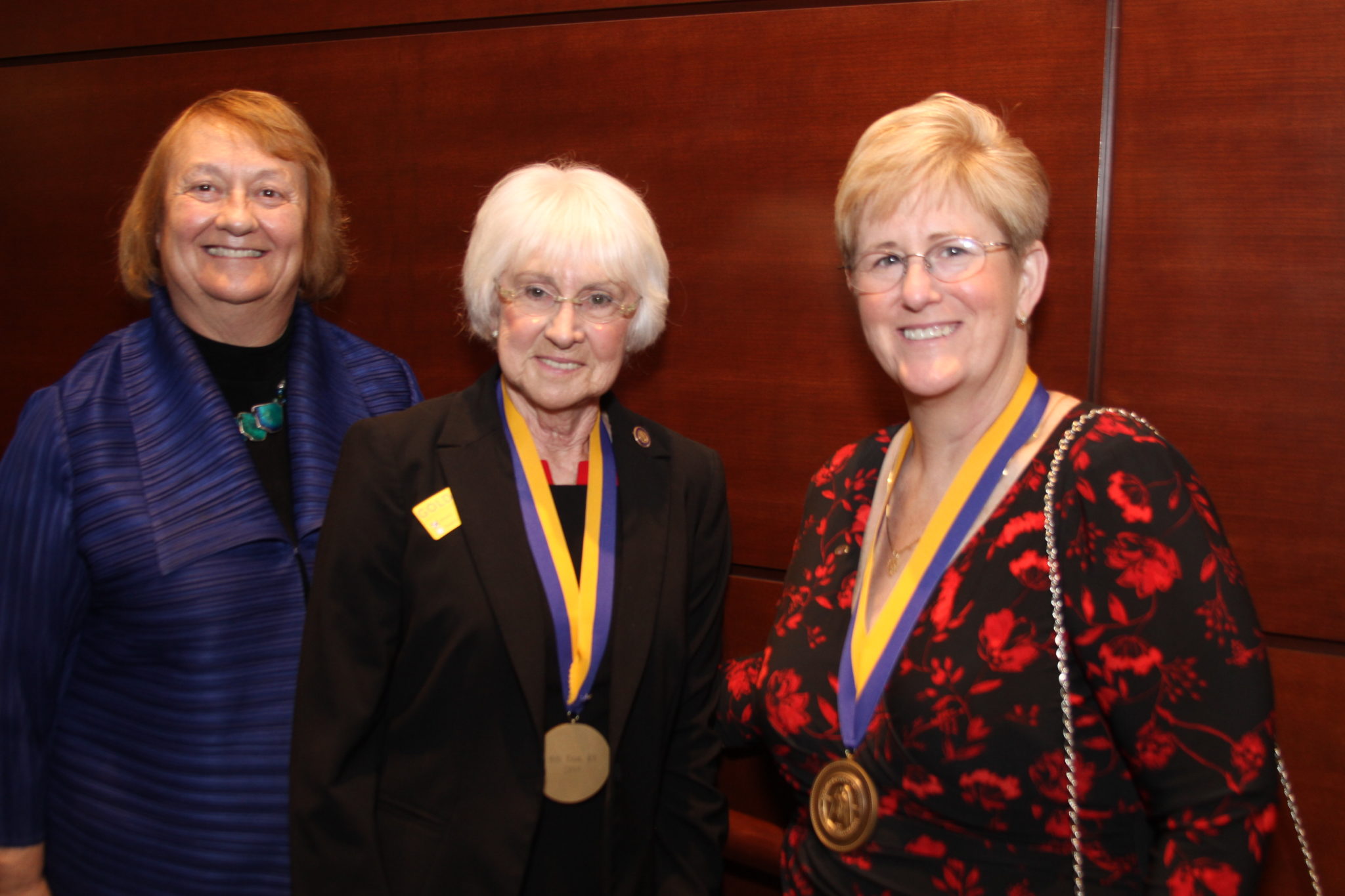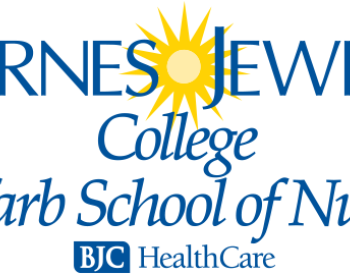

The Barnes-Jewish College Alumni Association awarded Mildred ‘Milli’ (Moore) Yium, RN, MS, (1962), a nurse and clinical psychologist in the Chattanooga, Tennessee, area, and Colleen Gilmore, RN, MSN, ANP-BC (1985 and 2009), a BJC Hospice nurse practitioner, the 2018 Distinguished Alumni Award. The Barnes-Jewish College Alumni Association has awarded alumni from Barnes-Jewish College Goldfarb School of Nursing, and their legacy schools, the prestigious honor of the Distinguished Alumni Award since 1985.
The annual award, presented each fall during the college’s homecoming festivities, was created to commemorate graduates who have made outstanding contributions to nursing and community during their professional careers. The award also knowledges the life journeys of the awardees, and it recognizes extraordinary dedication and commitment to nursing service, research or/and education.
In 2018, Mildred ‘Milli’ (Moore) Yium, RN, MS, (1962), a nurse and clinical psychologist in the Chattanooga, Tennessee, area, and Colleen Gilmore, RN, MSN, ANP-BC (1985 and 2009), a BJC Hospice nurse practitioner, were both recipients of the Distinguished Alumni Award.
Here’s more about both of them:
Milli Yium, RN, MS
(Watch her video by clicking here.)
To understand the arc of her nursing career, says Milli Yium, RN, MS, one can simply look at the history of dialysis in the United States. Yium, known by all as Milli, was instrumental in introducing dialysis in hospitals and outpatient clinics in Chattanooga, Tennessee. When she and her husband, Jackson Yium, MD, a nephrologist, moved to that state in 1973, they took on what Yium calls “a daunting, but exciting adventure” — the creation of the nephrology service at Erlanger Health System, the area’s only teaching hospital.
But we’re getting a bit ahead of the story. The move to Chattanooga happened after years of education, experience and acquired expertise.
Yium was born in the small town of Holcomb, Missouri, on a cotton farm situated south of Cape Girardeau. She grew up doing farm chores and helping care for her aging grandparents. Something in her nature helped her determine, as a third-grade student, that she wanted to be a nurse. After high school graduation, she joined a cohort of 96 students admitted to the Barnes Hospital School of Nursing, and she graduated in 1962 with special honors.
Life moved rather quickly after acceptance in the nursing program. “In August of 1960, I was the charge nurse on the night shift of 2400, a 24-bed ward for female internal medicine. No other nurses, only hospital aides, were there to assist.” Yium remembers little time for sleep in those years of study in daylight hours and work at night. After Yium learned the sterile scrub procedure, she began assisting in surgeries. “I found orthopedic surgery fascinating. My days on the farm made using all that equipment an easy task.”
After graduation, Yium joined the team on Barnes Hospital’s neuro-medical floor, then received an offer from ophthalmologist Paul Cibis, MD, to help establish a division focused on treating retinal detachment with photocoagulation. Yium relished the challenge — and rose to meet it. Within 18 months, she and Cibis had the program up and running.
Two long-distance moves later with her husband, first to New Hampshire and then to Texas, Yium began working at the Veterans Administration medical facility in Houston, teaching home dialysis to patients. Jackson Yium pursued specialization in nephrology and transplantation. At that time, patients were trained to perform dialysis at home; there were no dialysis units in hospital or outpatient centers. Yium found that educating patients “took a lot of skill, patience and determination” to ensure they were successful at home care. And she had found her niche.
By the time the Yium team moved to Tennessee in 1973, she had honed her skills as a renal nurse and he as a specialist in nephrology. But the field of dialysis was in its infancy. Erlanger had only one coil dialysis unit. When Yium encountered it for the first time, she said, “I know how to run that machine,” and the dialysis program began. Yium became a leader in the field, training nurses in dialysis, working with her husband to open inpatient and outpatient clinics to serve patients with renal disease. “When we arrived in Chattanooga, there were no services for renal patients,” Yium says. People were dying. The first inpatient dialysis treatment at Erlanger took place in an intensive care unit. The Yiums expanded the program to two dialysis machines, one bed and two chairs in a semi-private room. Chattanooga now has 13 outpatient dialysis clinics and five hospital-based dialysis centers. Lives are being saved.
What Yium learned through her exposure to patients with renal disease is that she is very good at — and very much enjoys — working with people who have chronic illnesses. That affinity sent her back to school to earn a master’s degree in clinical psychology from the University of Tennessee, Chattanooga. In 1980, she opened a private practice to offer psychotherapy to people living with chronic illness.
Now retired from professional life and working as a volunteer with the Kidney Foundation of Chattanooga, which she and her husband helped found, Yium looks back on her career with satisfaction. “It’s been exciting. Yes, I’ve written lots of protocols and teaching manuals, but I’m most gratified by the work I’ve done as a pioneer in dialysis, providing emotional and educational support to those who needed it most.”
Colleen Gilmore, RN, MSN, ANP-BC
(Watch her video by clicking here.)
What adjectives best describe a good nurse? Many people would put “compassionate” at the top of their list of essential qualities. And that list would likely also include these attributes: intelligent, detail-oriented, efficient, curious, scientific, disciplined.
But maybe that’s not the way to go about defining a good nurse. Maybe the qualities that ensure excellence in nursing are as diverse as the nurses that embody them. Perhaps it’s illuminating to ask, “What makes this nurse good at what she does?”
What makes Colleen Gilmore, RN, MSN, ANP-BC, a good nurse — and a leader in her field? Compassion, loyalty certainly, and education, training and commitment. But what sets Gilmore apart, what makes her unique, is her stated goal: “I want to care for the whole person.”
That desire essentially defines the course of Gilmore’s career, a career that has encompassed a variety of positions and areas of medicine. The common thread, however, has been her insistence on treating the sum of a patient’s life, not just the affected organ or limb.
To help explain her career choice, Gilmore says, “I was a candy striper in high school.” She thrived in science and biology classes — and she helped care for her grandmother with end-stage heart disease. Gilmore knew she was headed for nursing school. She graduated from Barnes School of Nursing (now Goldfarb) in 1985 with a nursing diploma, then from Webster University in 1992 with a bachelor’s degree in nursing and finally from Goldfarb School of Nursing in 2009 with a master’s degree as an adult nurse practitioner.
In 1985, after completing her training in nursing school and working as an undergraduate nurse in a rotation of diverse nursing floors within Barnes Hospital, Gilmore became a member of the nursing team on the 10500 medical unit, caring for people with multiple chronic illness. She then accepted a position with the team that provided care to patients in the cardiothoracic step-down unit at the hospital, where she acquired experience working with patients and their families in the transition from hospital to home.
Gilmore drew on her skills as a communicator and educator. And she found it gratifying. “I discovered I’m drawn to people with chronic illness,” Gilmore says. “I find it especially satisfying to care for them — and to support their families.”
Gilmore’s career path next took her to work outside the hospital, as a field nurse caring for people in their homes or in nursing homes. The patients she met often were living with terminal illness and facing end-of-life concerns. These people truly needed Gilmore’s ability to see them as whole people in need of physical, psychosocial and spiritual care. Identifying these needs and securing the appropriate kinds of care soon became Gilmore’s area of expertise.
In 1992 and throughout a good part of that decade, Gilmore chose to work in both the palliative-care and hospice services at Barnes-Jewish Hospital. She helped establish the hospital’s first home supportive-care program (before the advent of palliative care). “My patients were still receiving medical treatment, but that wasn’t all they needed. They had psychosocial and spiritual needs, and I worked to help them receive care for those issues, too.”
Gilmore has also served as a nurse coordinator at the Siteman Cancer Center at Barnes-Jewish Hospital and Washington University School of Medicine. And she also cared for patients’ needs while working in the GI lab at Missouri Baptist Medical Center.
Gilmore also found time to build a satisfying personal life. She married Loretta Haggard, an attorney, 23 years ago; the couple adopted a son from Guatemala nearly 17 years ago. Gardens and orchids and the St. Louis Women’s Choir further enrich her life.
Then, in 2011, Gilmore says, “I found my way back home.” That’s when she accepted a position as a nurse practitioner in the BJC Hospice program. Still serving in that role, she spends two weeks each month caring for patients at Evelyn’s House, an inpatient acute care hospice facility for adult and pediatric patients located on the campus of Barnes-Jewish West County Hospital. There, she does what she loves: treating the whole patient and family, caring for patients with acute symptoms related to their terminal illness. Supporting them in a most difficult and vulnerable time of life. The other two weeks of the month put Gilmore on the road, traveling hundreds of miles to see patients and families in their homes, supporting the home hospice nurses with symptom management, and training new hospice nurses, physicians and nursing students on care of patients with terminal illness and their families. She also delivers talks about hospice, palliative care and end-of-life issues.
Gilmore says her work as an educator and advocate is important. And she’s good at it. “But I love being at the bedside,” she says. "Caring for patients and their families is the most important thing I do.”
Visit the Distinguished Alumni Award page to learn more, see full criteria and nominate an exceptional nurse for next year’s award.
Follow the Blog via Email
Enter your email address to follow this blog and receive notifications of new posts by email.
Follow the Blog via Email
Enter your email address to follow this blog and receive notifications of new posts by email.

